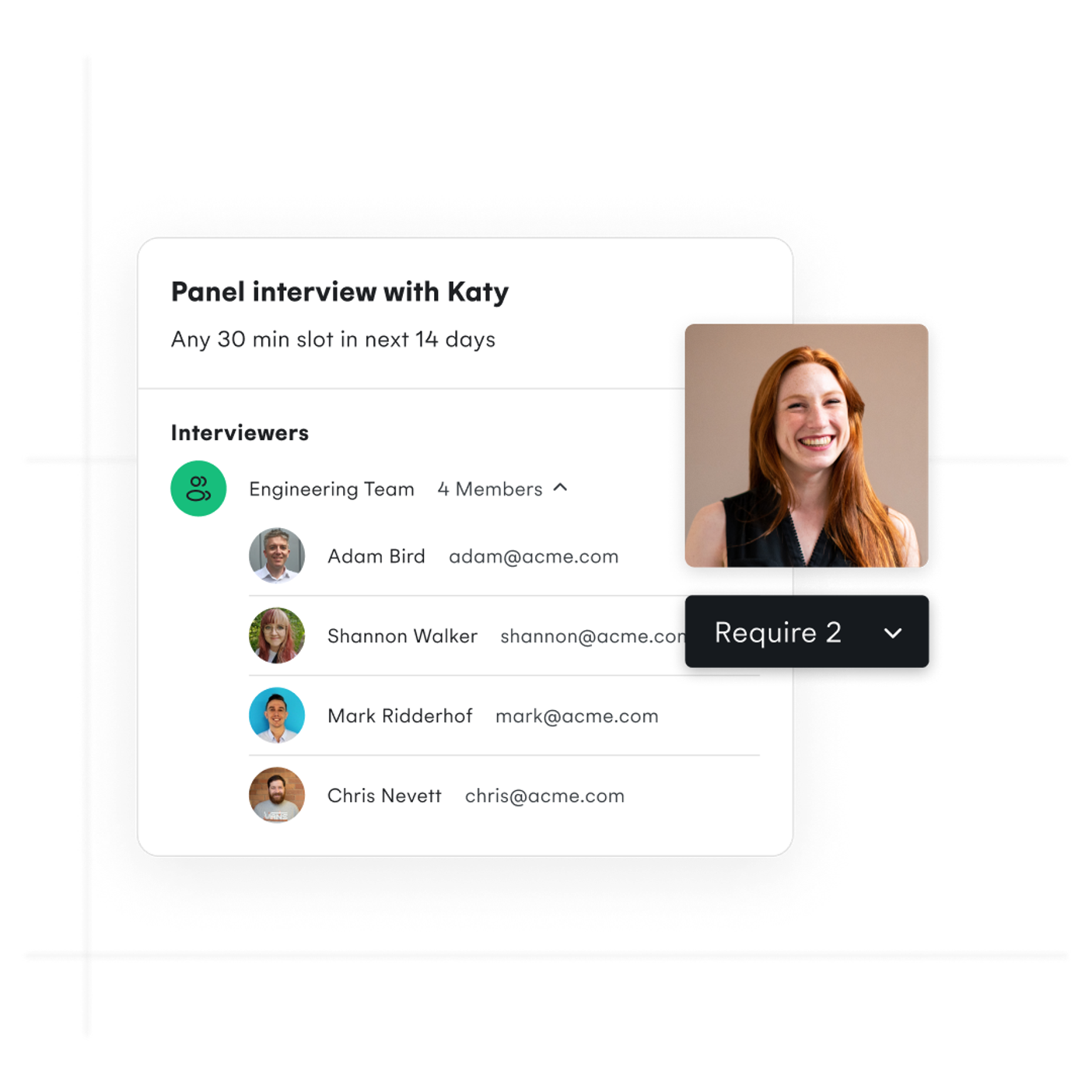Introduction: Why we're here
Now in its 4th year, the Candidate Expectations report is back on a scale greater than ever before. This year, we surveyed 12,000 candidates on their loves, hates, and hopes in recruiting across the UK, France, Germany, USA, Spain, Canada, and the Netherlands. We seek to unpack these findings.
As the increasingly competitive market reckons with the pendulum swinging away from favoring candidates, jobseekers are getting increasingly jaded with lackluster recruitment experiences. Long wait times to schedule, ghosting, and a lack of communication are placing a larger mental burden on candidates than in any previous year. There has been a dramatic shift from last year when it comes to time taken to schedule first interviews, as more candidates ready themselves for waits of a month or more.
First impressions still matter, and they certainly last—it’s taking longer for candidates to drop out of recruitment processes, but their levels of dissatisfaction over communication could mean that they’re carrying this resentment to their roles. In turn, this has knock-on effects on the quality of hire and their time to productivity. Let's look at what the data is saying about candidate behavior.
At what point do candidates leave interview processes?
42% reported to leaving the recruitment process when it takes too long to schedule an interview, down from 49% last year, signalling that candidates feel less secure in the job market, and have grown more used to frustrations in interviewing.
Despite this, those less likely to recommend or engage with an employer in future based on frustrating interview scheduling are still 13% more likely to drop out of the recruitment process—a higher jump than in previous years.
Fewer people are leaving the recruitment process
because they were frustrated with the time it took to schedule an interview

But the drop out rate is higher
with those less likely to recommend or engage with an employer in future, based on frustrating interview scheduling

What does a company’s hiring process say about its people?
First impressions last. A company’s people are its window into the business, and how they’re treated matters—candidates are looking at this closely when making their decisions. 38% feel that well-managed hiring processes show that companies care about their staff, and a further 33% perceive it to mean a company has a good culture or ethos.
61% of interviewees feel that recruitment should shift its focus more on the candidate as an individual, rather than a one-size-fits-all approach that puts the company first.
Learning: Candidates expect companies to know them after they’ve put in the time in getting to know the company. 67% agree that they’d be annoyed if they had to repeatedly fill in their details to arrange interviews if they’d previously communicated with the recruiter.
Want to improve candidate experience?
Your search ends here. Get access to more exclusive insights and resources to improve how you hire.
Candidates seek real-time connections with recruiters
The top method of preferred communication for candidates was email. As the number of job interview rounds increased, interviewees showed an increasing preference to scheduling next stages to be face-to-face, signalling the value of being able to make plans in real time as email chains drag on. They were also keen to reduce the possibility of ghosting.
UK (29%), Canada (31%), and US (22%) were the most likely to have online stages in the recruitment process. Just 16% of Spain list their preferred communication method as email. Face to face (39%) and telephone (28%) facilitate greater speed and connection.
Globally for candidates, the preferred way to schedule interviews is through email. But email can sometimes feel like snail mail when there’s too much back and forth, so it’s no surprise that candidates across many geographies prefer face-to-face scheduling. They simply want to be able to schedule instantaneously with the latest availability. Rather than solely relying on manual face-to-face and telephone methods, this suggests there's a significant opportunity for recruiters to implement an automated scheduling tool that takes delays and manual work out of the equation.
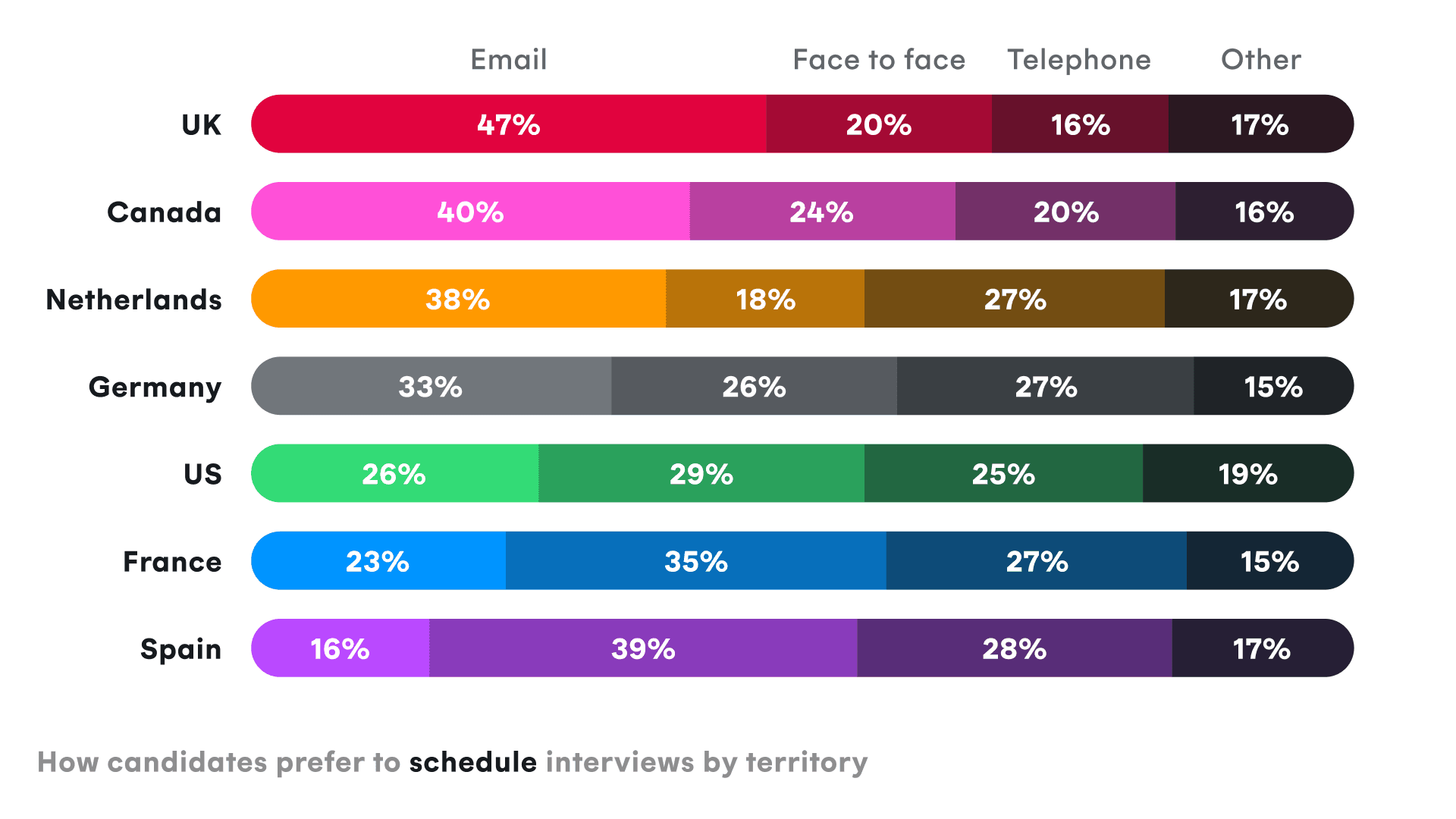
Everyone knows hiring processes take time, but how much of that time is used meaningfully, and how do candidates feel when that isn’t the case?
Email is the primary tool
used by recruiters and employers when communicating with candidates

Are you a recruiter?
No more spending two hours to book a thirty minute call. Learn how you could streamline your day with scheduling automation:
The psychological impact of long interview processes
Global worker stress levels have been at a consistent record high, with 44% reporting to experience stress for a large part of their day. This impact on wellbeing is being echoed throughout the recruiting process.
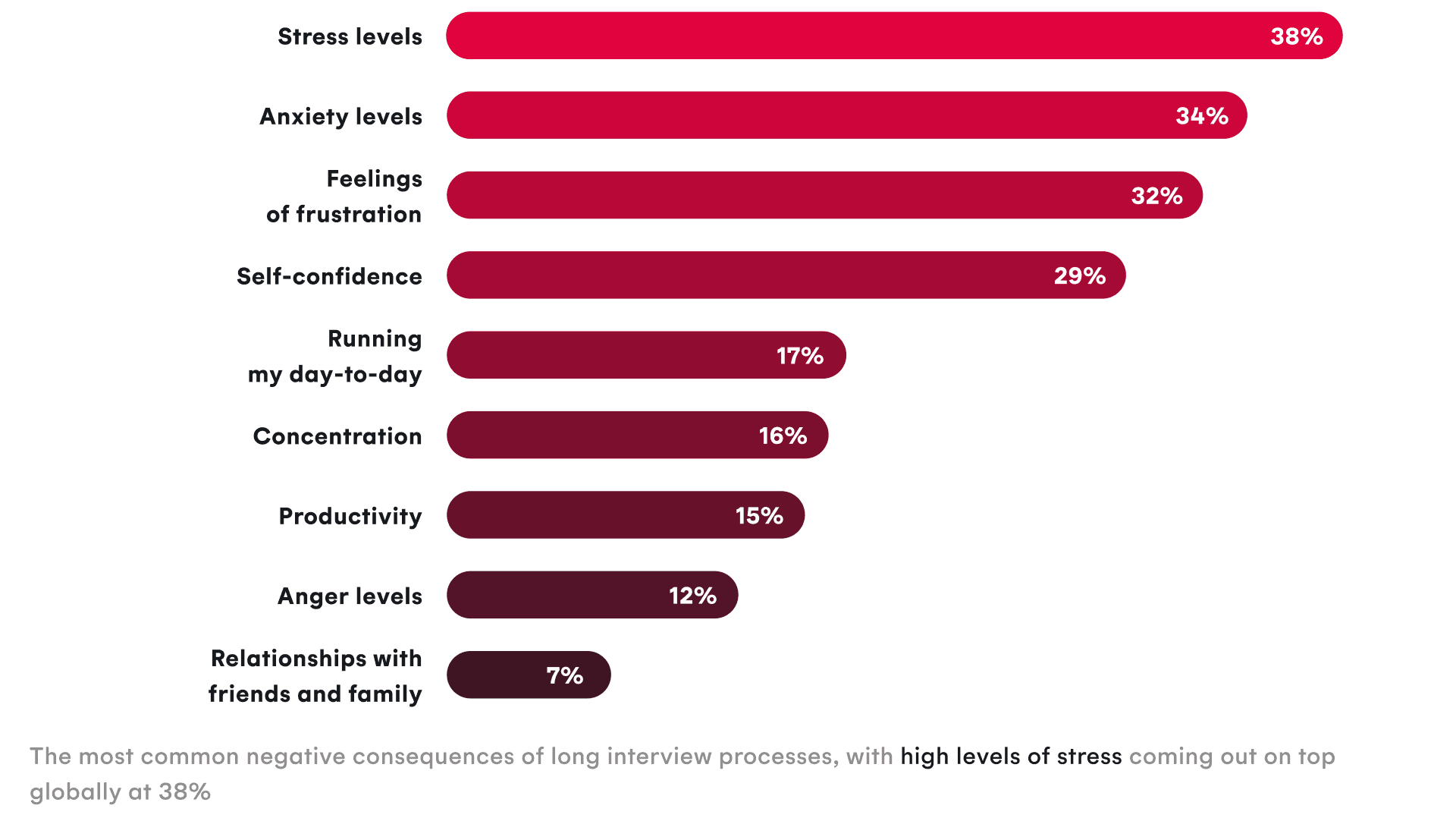
As the nation who ranks human touch in recruiting as the highest priority in recruiting (42%), France was the most stressed by slow interview processes, with almost half (49%) of candidates reporting increased levels of stress due to tedious processes—long times between touch points put developing relationships at risk.
France was the most stressed
by slow interview processes, with 49% of candidates reporting increased levels of stress due to tedious processes

When do delays get too much?
When asked at what point they would disengage from an interview scheduling process or form a negative impression of the company, this year’s results showed candidates are more used to longer waiting times than in previous years. A higher proportion (36%) of candidates in 2024 would disengage at the one-month mark, up 12% from last year. 12% of candidates would do so at the 1-week point, less than half of the previous year. This speaks to the tougher current market for candidates in general.
More people would wait one month or more
before disengaging from an interview scheduling process, with the number of people waiting for one week falling significantly

The importance of a clean slate when starting new roles
Quality of hire is one of the most important metrics when making decisions on placements, so it’s no wonder hiring processes are getting longer as TA teams try to make the right choice. This inevitably becomes more frustrating—is this fair to candidates, even if they end up accepting the role because they have fewer options? To reduce attrition and ensure engagement and faster time-to-productivity, new joiners shouldn’t carry resentment from an experience that made their time feel disrespected. Similarly, implementing a no-ghosting policy and a commitment to qualify candidates out in a timely way ensures that even those who haven’t had success don’t have a negative experience.
In a crowded market, recruiters might think there’s always another candidate available, but the competition for the most skilled talent remains heated. Moving candidates through processes by scheduling efficiently and communicating throughout will reduce dropout rates and fill out roles more quickly.
Learning: Those hiring do not need to choose between the best quality hire versus filling roles fast. By utilizing tools that save hours of time compared to manual scheduling, talent teams can move with efficiency and thoughtfulness, using the saved time for meaningful personal communication with the candidate instead.
The impact of ghosting
Ghosting is on everyone’s minds in TA—all candidates have experienced it, but no one wants to admit to having done it. What kind of impact does a lack of communication has on candidates? We posed this question to a psychologist consulting in organizational development to unpack.
In 2024, there are no excuses for ghosting candidates anymore, because there are multiple tools and systems to support you in giving feedback to candidates. You can use an ATS to schedule communications, there are assessment solutions that offer automated feedback on test results. In the recruiters defence, I think one reason for ghosting is actually the good intention of wanting to give manual feedback, yet only few of us have enough time to actually do it.
— Malin Freiman Moezzi, Licensed Psychologist
Instead of integrating automatic communication, they postpone manual feedback, and then often it ends up being overwhelming and impossible to execute because they don't have enough time. I don't think we should shy away from automated feedback, because it's an amazing support to keep close contact with candidates, especially in longer processes. The important thing here is to set clear expectations and give information beforehand regarding when and how you will communicate throughout the process. Make sure to give candidates a point of contact if any questions occur, because we also need to remember that the only thing worse than getting rejected is not getting any information at all.
— Malin Freiman Moezzi, Licensed Psychologist
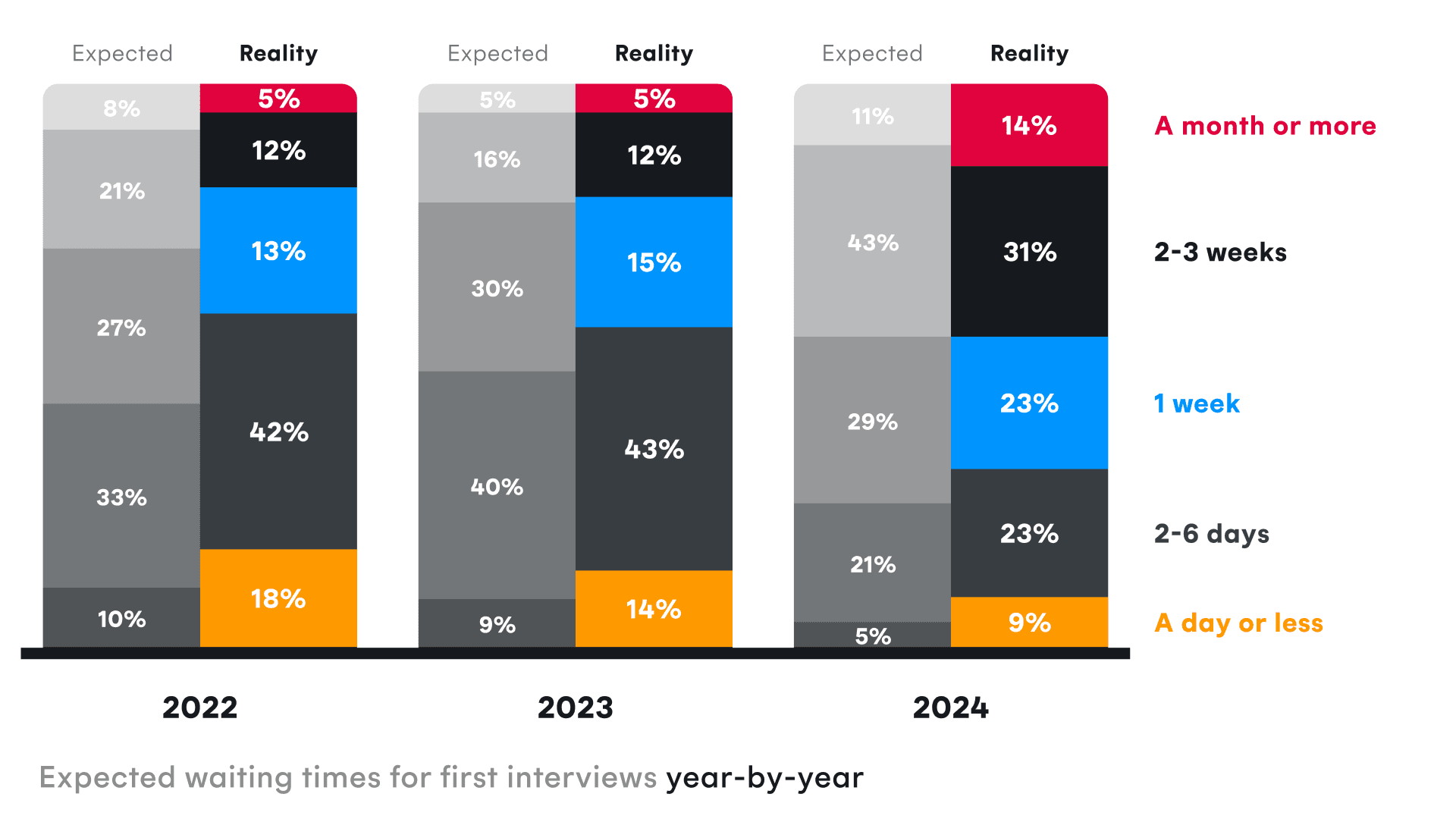
21% expect to wait 2-6 days between applying for a job and scheduling the interview (before giving up on the process), 29% expect a week, and a further 34% expect 2-3 weeks. Only 5% expect scheduling to take a day or less—this is a significant opportunity for recruiters to give candidates an above average experience.
In fact, 57% say they would prefer an automated system that schedules interviews rather than lengthy back-and-forth communication. For most (60%), the past few years has made the expectation that businesses would be automation-first a given.
However, many candidates are still falling down the cracks and being ghosted. From the time they applied, just 9% of candidates were able to get a first interview scheduled in a day or less. Candidates value timely responses, and recruiters know the highest-skilled candidates get snapped up in a matter of weeks, not months. The largest proportion of candidates (31%) report the first interview took as long as 2-3 weeks to schedule—light years when it comes to candidates who are actively searching for new roles and might already be mid-way through another process. Both the expected time-to-schedule and reported time-to-schedule show that 2024 is the worst year for candidates so far.
Learning: Feeling respected and having your time valued matters. When faced with multiple offers, 70% of candidates would consider the smoothness of their recruitment process to be a key factor when making their decision on what role to pick. Candidates listed the most likely reason to be frustrated as a lack of responsiveness and poor communication (at 28%); it’s easy to see how the combination of respect and communication creates the pillars for a positive candidate experience.
Creating inclusive processes for neurodiverse candidates
With recruiters striving to improve in Equality, Diversity & Inclusion, drawn-out processes are leading neurodiverse candidates to feel higher levels of stress compared to other parts of the population, at 56%. They also report lack of responsiveness and poor communication to be the most frustrating part of the hiring process (34%), and were more likely than the global average to value clarity and inclusivity as the top considerations in the hiring process at 37% and 10% respectively (both 3% higher than global average).
Neurodiverse candidates prefer to take charge of scheduling interview processes, and feel any difficulties relating to that more acutely. A larger majority than average (58% compared to global average of 53%) say they would prefer to schedule their own interviews through provided time slots. 56% said they have left recruitment processes because they were frustrated with the time it took to schedule an interview, compared to a global average of 42%.
The key to a good process is transparency and respectful communication. Our job isn’t just to assess but also to enable a situation for a candidate to show their competency — right now, we’re not even doing the bare minimum. No process will ever be 100% fair towards all candidates — hiring is biased towards extroverted behaviors, and we know that physical attributes affect the bias of the recruiter, and to that, add a layer of having an autism, anxiety, ADHD, or dyslexia diagnosis. We shouldn’t expect individual recruiters to be the expert here. Instead, we need to ensure there are recommendations and policies for how to take it into consideration when a candidate addresses that they have a hard time with the process.
— Malin Freiman Moezzi, Licensed Psychologist
The neurodivergent path is wide with many different categories, and not everyone with the same diagnosis experiences the same challenges. This makes it difficult for one recruiter to take executive decisions on how to make exceptions. We should strive towards being more inclusive by using and developing better tools, which I know researchers are working on, but we’re not quite there to automate this process at scale yet. Give the right guidance and enough time for all candidates to prepare, establish an honest and respectful communication, and take this information under consideration during our assessments.
— Malin Freiman Moezzi, Licensed Psychologist
Recruitment processes may look inclusive on the surface by asking for reasonable adjustments, but talent teams should keep in mind that providing an experience that serves all candidates does not stop there. Consider whether your hiring processes reflect the environment you create internally to support neurodiverse staff.
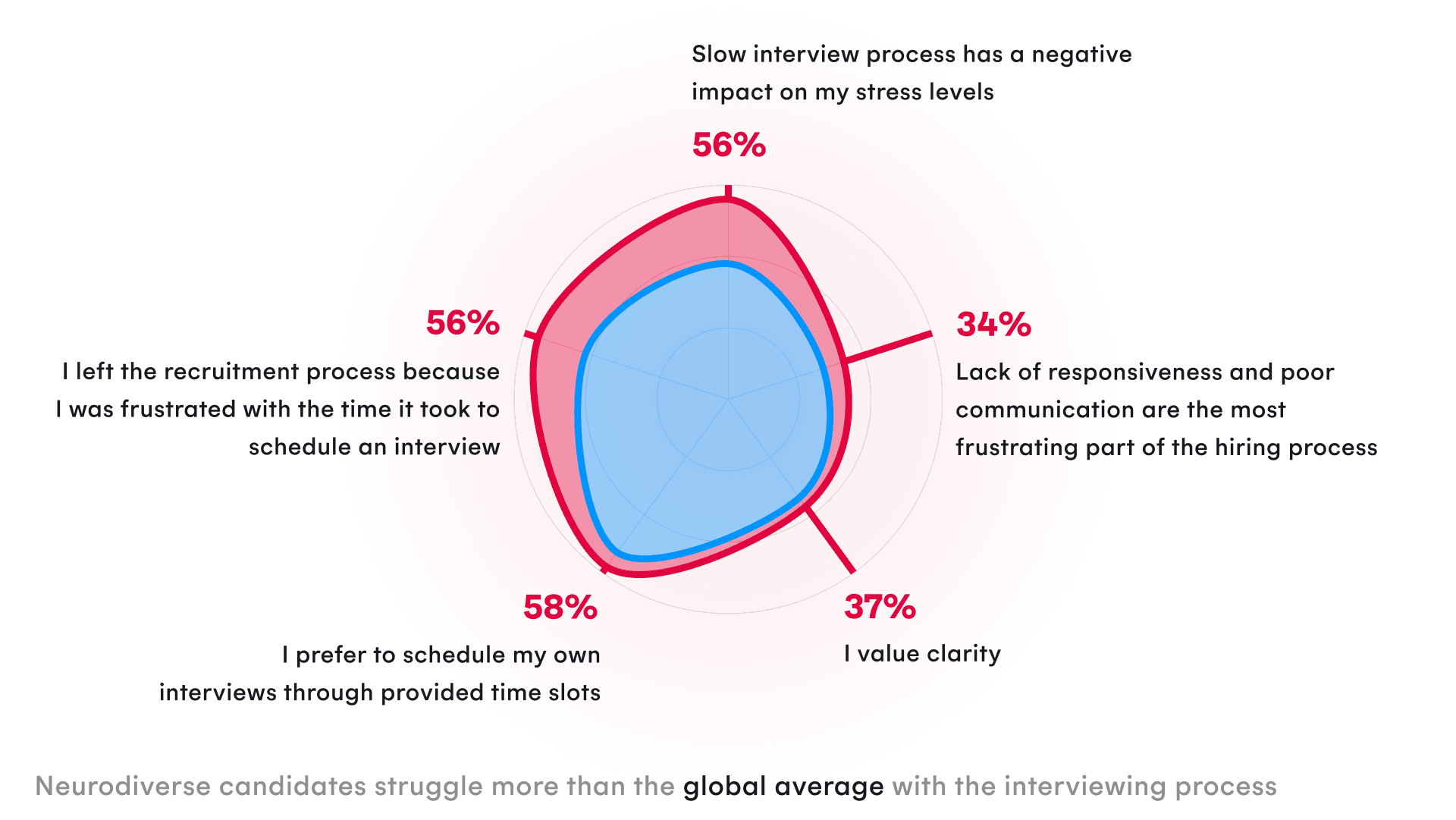
Negative emotions vary by role
Those working in creative roles (Media, Marketing / Advertising / PR / Market research sectors), were far more likely to report more negative consequences due to slow interview processes. They were at the top of almost every category and much more inclined to suffer from problems regarding: stress levels (45%), anxiety levels (38%), feelings of frustration (39%), self-confidence (34%), productivity (22%), and anger levels (17%), all directly as a result of inefficient interviewing.
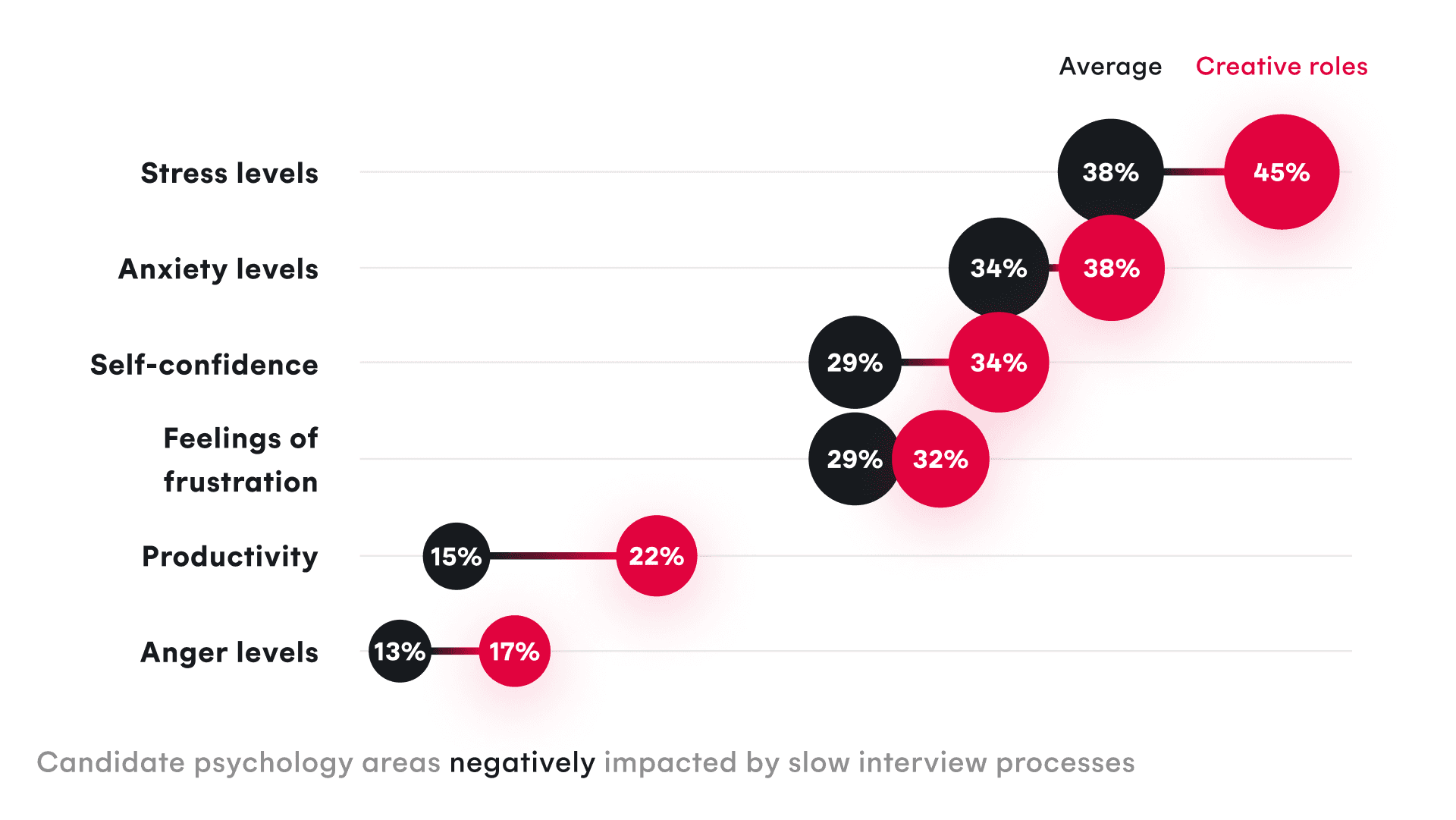
Recruiting for these functions usually involves creative task-based and panel interviews with multiple stages, suggesting candidates are likely to suffer as a consequence of slow communication and lack of feedback between rounds, particularly because their tasks are more likely to be creative and subjective. This should create impetus for recruiters to provide robust, timely feedback and quicker next steps. They were also the least resilient to stressors and the least likely to feel unaffected by slow processes, at a mere 11%. Lastly, they were the most likely to perceive this to be a lack of care towards candidates over any other sector, at 41%.
Subjectivity in creative tasks demands feedback
Is skills-based hiring a buzzword, or a genuine path forward? It’s a priority for 73% of recruiters according to LinkedIn. As organizations make the shift towards becoming skills-based, creative roles can tell us a lot about what hiring for other sectors might look like in the next few years. Candidates across levels of seniority are having to complete tasks for interviews, many for the first time, on both junior and senior ends of the scale.
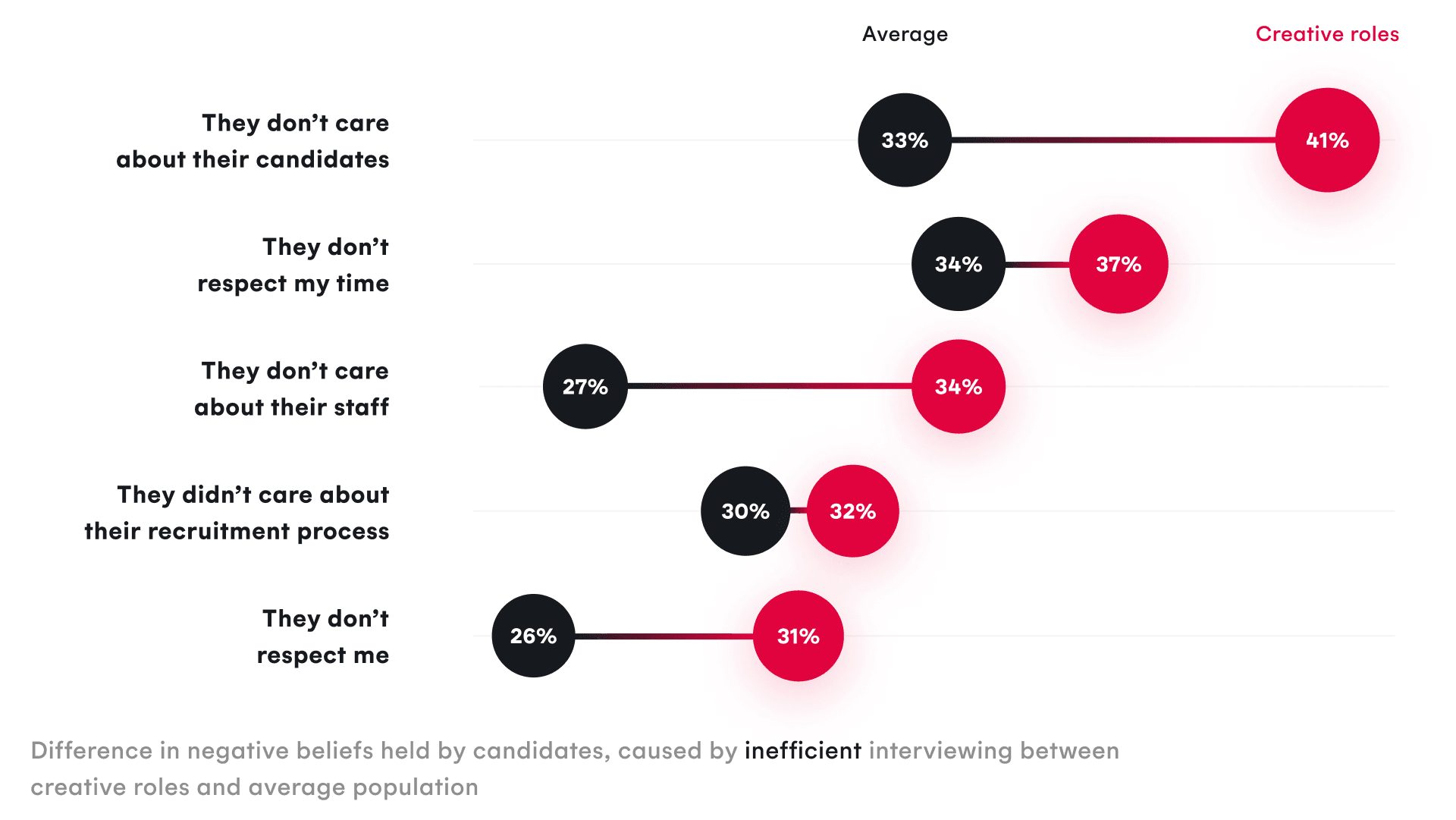
Learning: Skills-based hiring is not inherently more objective. To ensure candidates are being judged fairly, talent teams should look to be transparent on what skills they are looking for in the interview. Communicate tasks with clarity, clear assessment criteria, and timelines—take a proactive and timely approach to scheduling and providing feedback will ensure candidates feel the time they gave up was valued.
The most commonly frustrating part of the interview process was a lack of responsiveness/poor communication for 28% of candidates. Some regions feel this more keenly than others—the Netherlands reported this to be 38%. A lack of transparency was second on the list globally at 17%, but of particular importance to Spain, who were at 26%.
Poor interviews pose dangers for brands
Inefficient and insensitive hiring processes can have significant consequences on your brand perception, lasting way beyond the initial interview experience. Here’s what candidates had to say about what perception they’d have of a potential employer that had a slow or disorganized interview process:
Time is more valuable above all else
with candidates feeling a lack of respect when interviews are inefficient

Candidate opinions on slow or disorganized processes
When interviewed, candidate responses range from sympathetic to severe. Some give interviewers the benefit of the doubt, either because “they might be having a bad day” or that “their staff are overworked or otherwise too frazzled to go through things.” Others perceived it more personally to say:
I might presume it reflects the quality of my candidacy (could it mean I’m less qualified than I thought)
They consider their time more valuable than mine.
That they weren't trained properly that the individual is stressed and struggling. Or that they have a high turn over rate and they keep their applicants for later use and only called me in after so many didn't work out.
I would be worried that this type of disorganization is throughout the workplace.
Some took it as an omen of things to come, with one candidate believing this signified that “there is a problem within the company that may affect my job later”. Another spoke frankly of the need to improve: “I honestly would think they are unorganized and need better management with scheduling interviews.”
Candidates share experiences with peers or family
Conversely, those who were moved through a process with automated scheduling are more likely to form positive perceptions of the company. “They respect both employees and applicants time,” one candidate said when asked what they would think of companies that use quick and efficient scheduling systems. It’s clear that high-performance organizations interview candidates more efficiently and mindfully, as they understand the value of candidates’ time.
Whether a hiring experience was negative or positive, candidates are likely to share their experiences within their inner circles and on public-facing sites like Glassdoor, which other prospective candidates will research.
Let’s dissect this further to see how positive experiences can be meaningful in shaping brand perception and candidate self-efficacy.
How candidates view fast scheduling
Candidates perceive an efficient hiring process to be the most significant sign of respect to themselves—44% think it means companies care about their recruitment process, 43% feel it shows care towards candidates, and for 41%, it symbolizes a respect to them as an individual.
Over the years, candidates have grown more jaded with scheduling difficulties, yet for 62%, the time taken and overall experience in interview scheduling forms perceptions of employers early on.
Netherlands scores the highest
with 71% of candidates reporting the interviewing process and the time it takes to arrange it, affect their perception of an employer

Almost half (48%) of candidates would be less likely to recommend or engage with an employer in the future if interview scheduling wasn’t up to par, and they wouldn't hesitate to tell their fellow jobseekers. This could have a significant impact on an employer's future talent pool, as well as on brand perception.
Learning: Companies should aim to convey their organization’s principles through their recruitment process. By ensuring candidates are treated with respect, they can nurture positive relationships with candidates beyond the recruitment process, either setting them up to excel in their new role, or to continue to keep them in their professional networks.
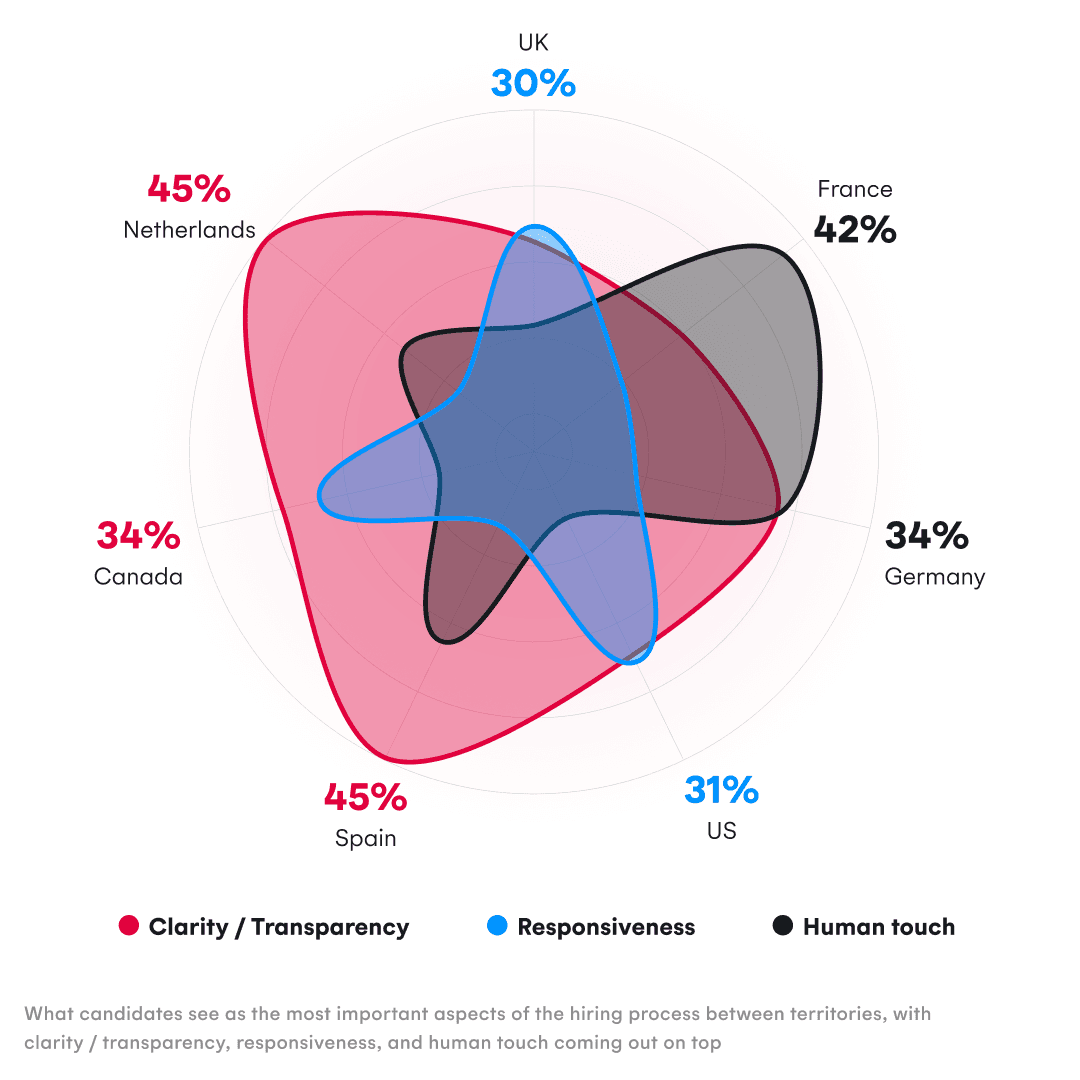
Balancing human touch and automation
Hiring teams are under increasing pressure to balance their workload and give candidates a personal experience, all whilst ensuring everybody gets a response.
Automation has its place, but in the world of endless cover letters and automated responses, candidates often feel like they’re speaking into the ether. For 81%, having a human touchpoint and someone to contact during the recruitment process is vitally important. This has remained consistently high throughout the years and is unlikely to change soon.
Which parts of the hiring process frustrate candidates most?
How should recruiters strike the balance with technology and automation? First, let’s define what candidates are struggling with.
Candidates seek better communication
which hiring teams are struggling to deliver with their current workload, alongside issues of transparency and convoluted steps

Ambiguity around Generative AI
Candidates are experimenting with automation themselves, as many are using generative AI to streamline previously manual processes. 56% of candidates have already used generative AI in their application in some form—21% to optimize their CVs, 21% to tailor CVs to job descriptions, 20% for creating supporting content like cover letters, and 15% to mass apply to different roles. They're not alone. 45% of recruiters also report using generative AI on automate tasks to focus on more fulfilling work.
Whilst many institutions are tightening rules on the use of generative AI, recruitment’s view on it remains inconsistent, leaving some candidates working manually, and some speeding ahead with automation.
Of the 56% experimenting with AI
candidates are focusing on streamlining manual steps to speed up their time-to-application, alongside casting a wider net of applications in light of increased competition

Learning: Although filtering for AI-based mass applications and establishing a stance on the use of AI takes time, companies can control the quality and clarity of their assessment criteria to ensure that candidates who progress to the interview stage have the appropriate skillset required for the role.
Where do candidates want to see more automation?
Among areas where candidates want to see more automation to speed up the hiring process, interview scheduling emerges at the top at 37%.
Automation earlier on in the process
is where candidates feel there is the most need to solve their pain points, compared to the post-interview stage

This year’s results show that candidates prioritize human interaction throughout the hiring process, despite advances in tech and automation. Whilst automation is a positive step for companies, they should still prioritize integrating human touch points throughout the process to ensure a positive candidate experience. With a lack of responsiveness being the top reason why candidates are frustrated, it’s clear that getting the right automation tools in TA teams’ workflows to free up more time for personal communication could open up a lot of opportunity.
— Darren Bush, Global TA Lead at Ericsson | Podcast Host at TA Tech Unboxed
Do candidates, or TA teams hold the scheduling power?
When it comes to scheduling, candidates walk a tightrope of balance. Looking into interview scheduling in more depth, over half of candidates would prefer to have interview time slots provided to choose a time that suits them. The UK is the most independent of countries surveyed, with 62% preferring to select their own interview times.
Whilst over half of all candidates across geographies prefer being able to choose their own time within a scheduling interface, 40% said they’d rather have an interview arranged on their behalf through a back-and-forth via phone or email.
Learning: Candidates may be concerned about seeming unavailable or inflexible, so they prefer to cede scheduling power to the interviewers. As most companies do not use scheduling tools that factor in candidate availability, both candidates and recruiters feel like there is no choice but to settle for back-and-forth email chains. Rather than candidates having to rearrange their calendars to accommodate the recruiter, what candidates desire is simple—they just want times that suit them.
- Personalization at scale: Candidates are keen to see more automation throughout the recruitment process, but not at the price of human touch. Getting personalized feedback and having someone to contact throughout humanizes their hiring journey.
- Candidate empathy: The combination of a competitive market and an inherent power imbalance of interview scheduling means candidates are conscious of seeming unavailable, meaning they’re more likely to put up with scheduling delays than ever before.
- Hiring hesitancy: Making the wrong hire is costly, and the pressure to get it right is leading to longer processes. Recruiters no longer need to choose between hiring fast or hiring well—by reclaiming hours per week back from manual scheduling, they can spend that time making considered decisions all while ensuring that candidates do not drop out of the recruitment process over delays.
- Respecting candidates time: Despite the current macroeconomic climate, candidates don’t have infinite patience, and they want their time to feel respected. Almost half won’t hesitate to leave a recruitment process if they feel it’s taking too long to schedule an interview.
- Brand consequences: Candidate experience links directly to engagement, as half of candidates would be less likely to recommend a company or engage with it based on frustrating interview scheduling. Any experience, good or bad, could have an amplified effect on your brand image if a candidate chooses to share it on communities like Glassdoor.
Although there is some regional variation, one thing stands true. Hiring is a microcosm of the current economic situation—competition for jobs remains fierce. As applicants per job increase, leaner hiring teams are having to do more with less time, leading us to see longer response times and increasingly frequent ghosting that plagues candidate experience.
These findings present a significant opportunity to do better, and to take stock of whether you’re using all the tools at your disposal. To succeed in attracting top candidates, talent teams could focus on higher value tasks, such as preparing interviews that allow candidates to show their individual skillsets, and giving the personalized feedback they deserve.
When it comes to interviewing, it’s time to relegate back-and-forth emailing to find suitable times and shifting the rescheduling burden to automation tools.
What does scheduling success look like?
Integrating with 70+ leading ATS providers, Cronofy powers scheduling for over 180,000 companies globally. Discover how Cronofy users were able to streamline their interview processes with scheduling tools.
